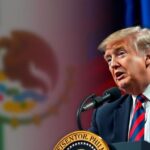Economy
Politics
AMERICA, APPLE, ASIA, CANADA, CHINA, CNN, DONALD TRUMP, ECONOMICS, FBI, HOWARD LUTNICK, LEGAL ISSUES, MEXICO, NATIONAL SECURITY, NORTH AMERICA, PHILIPPINES, TAIWAN, TRUMP, TRUMP ADMINISTRATION, U. S. JUSTICE DEPARTMENT, UNITED STATES, US-CHINA RELATIONS, WARREN BUFFETT, WASHINGTON, WHITE HOUSE
Sophia Klein
Trump’s Tariffs on Canada, Mexico, and China: Economic Implications and Strategies
President Trump has declared new tariffs on exports from Canada, Mexico, and China to combat the fentanyl epidemic. He argues these tariffs will pressure neighboring countries to enhance their border and drug enforcement policies. Critics, including Warren Buffett, warn that these tariffs may significantly increase costs for American consumers, particularly affecting the automotive industry.
President Donald Trump has announced the impending imposition of significant tariffs on exports from Canada, Mexico, and China, effective at midnight. Trump emphasized that no negotiations would take place with Canada or Mexico, insisting that these tariffs, described as “a beautiful word,” are essential tools to enforce behavioral changes among trading partners. The backdrop to this decision is a worsening fentanyl crisis that Trump believes these nations have inadequately addressed.
During a recent news conference, Trump highlighted an investment by Taiwan Semiconductor Manufacturing Company, totaling $100 billion in the United States, as a positive outcome from his tariff policies. He maintained that tariffs can influence neighboring countries, urging Mexico to enhance its efforts in managing illegal immigration and combating drug cartels. Recent actions by Mexico, including the extradition of cartel operatives to the U.S., appear insufficient in the administration’s view.
Economists and critics have expressed concerns regarding the economic repercussions of these tariffs, suggesting that American consumers will ultimately bear the costs. Warren Buffett described tariffs as “an act of war,” warning that their implementation could lead to increased prices for goods including automobiles, which could increase between $4,000 to $12,000. The White House remains hopeful that these economic pressures will incite necessary changes beyond border control.
Furthermore, the Trump Administration has indicated the possibility of additional tariffs targeting U.S. auto manufacturing plants, aiming to incentivize the repatriation of jobs from Mexico and Canada back to American soil. As Secretary Lutnick pointed out, the President is intent on restoring jobs that have migrated to these countries, reflecting a broader strategy to bolster domestic economic strength. This ongoing tariff policy signifies a robust stance in trade relations moving forward.
In summary, President Trump’s announcement of tariffs on Canada, Mexico, and China stems from a desire to address the fentanyl crisis and encourage neighboring countries to take more aggressive actions against drug trafficking. However, the economic implications for American consumers have raised serious concerns among critics and economists alike. The prospect of future tariffs could further complicate the U.S. manufacturing landscape by increasing automobile prices significantly.
Original Source: cbs12.com








Post Comment